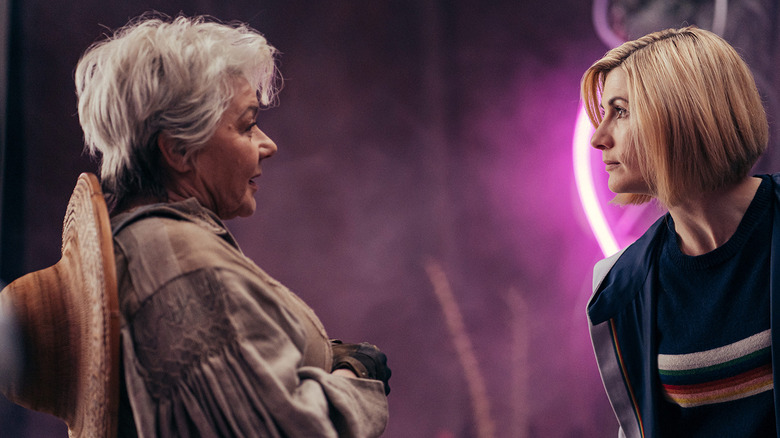Doctor Who: Flux Goes Around The World In Too Little Time In The Penultimate Survivors Of The Flux
The fifth and penultimate episode of "Doctor Who: Flux" feels like the closest to Marvel that "Doctor Who" has ever been — and that's not just because "Survivors of the Flux" throws around words like "multiverse" and gives UNIT an origin story ripped straight from the HYDRA infiltration of SHIELD (don't even get me started on the Division revelations and its parallels to "Loki"). It's because this fifth chapter of "Flux" feels like skimming through the pages of a comic book: alternately chaotic, cosmic, ambitious, and kind of a mess.
But "Survivors of the Flux" is setting the stage for the big crossover event, in which we'll finally see how these 20-something storylines come together, and whether showrunner Chris Chibnall will stick the landing on this lore-altering serialized experiment. Whether Chibnall can pull this off, however, is another question — especially after a rushed exposition-led hour such as this.
It's Not the Years, It's the Mileage
Probably the most successful part of "Survivors of the Flux" is the "Indiana Jones"-style escapades of Yaz, Dan, and Professor Jericho, stuck in the early 1900s for three years and on a mission to learn about the end of the world. We pick up with the trio in the middle of their globetrotting quest across Mexico, Constantinople, Nepal, and the Great Wall of China as they search for the date on which the universe will end. But while their "Around the World in 80 Days" subplot was the most entertaining, it felt like Chibnall falling back on his worst habits of plot for the sake of plot. "Survivors of the Flux" is transparently rushing toward the finale, as any crucial character moments are breezed by in favor of map montages and a bad comedy routine from a Nepalese hermit.
Yaz is given mere minutes to develop her sadly neglected character arc, in a sweet moment in which she interacts with a hologram message from the Doctor, repeating the teasing insults ("all right, big head") and the vulnerable admissions ("I miss you," "I know you do") as if they're little mantras she repeats to keep her going. The brief moment of horror when Yaz has to order Dan and Jericho to dump a would-be assassin's body overboard is given little time to breathe either, almost forgotten in the rush of plot that is this episode. While Jericho continues his ascent to surprise fan-favorite of the season, there isn't much given to this trio other than to further the plot. And it's very little plot as it is: after all the globetrotting and assassin-foiling antics, the Yaz-Dan-Jericho trio simply find their way back to Liverpool in 1904, where they discover that "the mad mole" Joseph Williamson has built a series of underground tunnels that act as passages to other points in time and space.
Breaking the Multiverse
In the Doctor's storyline, we get a direct continuation of the cliffhanger from last week's stellar "Village of the Angels" (the success of which is looking more and more be mostly on the strengths of Maxine Alderton), with the stone crumbling off the Doctor's body as she awakens surrounded by Weeping Angels. She taunts them and they taunt her back, before she is transported to her destination: Division, the base of which is a grand sci-fi cherry tree, where the mysterious old woman (a disarmingly genial Barbara Flynn) from "Once, Upon a Time" awaits her. That woman is none other than Tecteun, the Gallifreyan who had discovered the Timeless Child and experimented on her to give Time Lords the power of regeneration, erasing all memory of the Doctor's past lives. Dressed fittingly as a gardener (because she trims the timeline, get it?), Tecteun reveals Division's mission: to guide events and shape history as they see fit. The Doctor is apoplectic at this blatant disregard for the Time Lords' policy of non-intervention (not that she's one to talk), and even more upset by the fact that she's finally facing her abuser in the flesh.
We all have our mixed feelings about the Timeless Child twist, and how it turns the Doctor into a godlike Chosen One rather than a hero who actively chose to do good, but let's talk about the other facet of the revelation: how it turns the Doctor into a victim. There's an interesting conundrum to this, as the Doctor has always been a sort of Edwardian traveler whose concept is somewhat tied to imperialist values (the more enlightened time traveler who shows humanity a better way, etc.), but here the Doctor is made out to be just another victim of the Time Lords. I have further mixed feelings about this too (I just can't wholeheartedly buy into the retroactive victim narrative), all of which I won't have time to get into in this episode review. And this episode being as packed with plot as it is, neither does the show.
The Doctor's angry accusations fall on deaf ears for Tecteun, who only scolds the Doctor like a child. "Morality was always your flaw," Tecteun all but gloats. Tecteun insists that there's nothing she can do to stop the Division's plan. What's their plan? To use the Flux, which they planted, to destroy the current universe and move onto what she calls "Universe 2" — the universe on the other side of the wormhole under which Tecteun first discovered the Timeless Child. The base in which the Doctor and Tecteun stand (alongside a very helpful Ood) is actually a spacecraft that sits between universes, a "seed vault" in which all remnants of the universe are stored to be transferred to the new universe. This might be the Doctor's chance to go home — at the cost of the billions of lives that will be killed by the Flux.
A Grand Serpent in Our Midst
It's 1958, and the Grand Serpent (Craig Parkinson) has found his way to Earth, where he's weaseled his way into the newly founded UNIT, long before the beloved organization ever crossed paths with the Doctor. He's going by the name of Prentis, and he spends the decades up through present day secretly shaping UNIT into an organization for his own nefarious means — with the help of the creepy eldritch snake that emerges from his body and kills whomever gets in his way by crawling out of their mouths, in a genuinely scary bit of body horror. But his machinations are discovered by none other than Kate Stewart, returning to the show after six years and as kick-ass as ever. However, her confrontation with the Grand Serpent ends explosively, forcing her to "go dark."
The Grand Serpent's subplot is barely relevant to the overall episode — it's just laying another piece of the puzzle ahead of the finale, while answering small questions both current (the snake tattoo on the assassin and other covert operatives all tie back to him) and past (the infamous UNIT dating controversy, more on that below), while laying the Easter eggs on thick. Brigadier Lethbridge-Stewart! Kate Stewart! Osgood mention! While those brief moments are nice (and they did in fact use a voice recording of the late Nicholas Courtney for that Brigadier cameo), it amounts to very little in the overall scheme of things. And while it's nice to know that UNIT wasn't written out of the show for a Brexit joke, this build-up to Kate Stewart's return (as wonderfully tough-as-nails as Jemma Redgrave is), is sadly anticlimactic. Here's hoping there will be more for her to do in the finale.
Playing Fetch
Tecteun and Division may be compressing the universe, but the show is finally compressing storylines! Bel and Vinder's storyline intersects with Karvanista's and Diane's (Dan's love interest, remember her) in a rushed bit of plotting that can barely be counted as a story as much as it is a check list of "things that happen." Bel and Vinder just miss each other again, as Bel attempts to land on a gorgeous planet that looks like a giant black crystal claw, but gets hyperjacked by Karvanista after one of the Lupari ships breaks formation. Vinder, meanwhile, lands on the planet with the help of a vortex manipulator, only to immediately get taken prisoner by a Passenger. Within the immense alternate dimension prison, he meets Diane, who has adopted a strangely aggressive personality since we last saw her.
Karvanista, meanwhile, has somehow gotten Yaz, Dan, and Jericho's giant painted message (which, inexplicably, they had to travel to the Great Wall to make?) and gets in a fight with Bel before they're interrupted by a mysterious attack. And just as that attack begins, the dozen doorways to the "dozen worlds" built by Williamson all start to make a furious knocking sound, much to the trepidation of Yaz, Dan, and Jericho. The Grand Serpent, meanwhile, is readying some kind of missile attack in preparation for a collaboration with the Sontaran army. And the Doctor is facing her own imminent dangers, as her attempt to stop the "seed vault" spacecraft leads her to discover that everything is converging on Earth. "Earth will be the ultimate apex of destruction," Tecteun declares, inviting the Doctor to open a whispering fob watch that contains all her past memories. But the Doctor has little time to make that decision, as Swarm and Azure arrive on the spacecraft, having built a psychotemporal bridge out of the lives they've harnessed. Before the Doctor can make sense of it all, Swarm steps in front of Tecteun and dissolves her into dust, killing her and preparing to kill the Doctor as well. We've been set up for a cliffhanger on multiple fronts, in an episode that has breathlessly rushed to get us here. But can the finale stick the landing? After such a steep step down following last week's fantastic episode, I'm starting to have my doubts.
Tidbits in Time and Space
- Let's get into the UNIT dating controversy (not actually a scandal about romantic dates): There has long been fierce debate among Whovians about the timeline of the paramilitary organisation UNIT. First seen onscreen in the 1968 serial "The Invasion," the timeline was immediately thrown into confusion to Brigadier Lethbridge-Stewart's timey-wimey introduction — his first story took place slightly in the future in the '70s, but his character later claims that he retired in the '70s, but also UNIT might not have been founded until the '80s? This episode clearly states that UNIT was founded in 1958, but throws things further into confusion by introducing Lethbridge-Stewart as a corporal. Was this Chibnall's attempt to rectify the timeline or a knowing wink at this whole continuity mess? Whatever, canon doesn't exist anyways.
- It's hilarious that this episode establishes that UNIT had a TARDIS the whole time while the Third Doctor was stuck for years on Earth trying to repair his.
- Most of the jokes this episode landed with a thud, but this exchange between the Doctor and the Ood did get a chuckle out of me: "I have no rabbits." "It's a metaphor." "Or hats."





